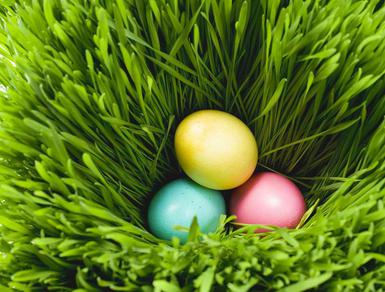Phillip's Egg
Phillip was born with Down syndrome. He was a pleasant child. . Happy it seemed but increasingly aware of the difference between himself and other children. Phillip went to Sunday School faithfully every week. He was in the third grade class with nine other eight-year olds. You know eight-year olds. And Phillip, with his differences, was not readily accepted. But his teacher was sensitive to Phillip and he helped this group of eight-year olds to each other as best they could, under the circumstances. They learned, they laughed, and they played together. And they really cared about one another, even though eight-year olds don't say they care about one another out loud.
But don't forget. There was an exception to all this. Phillip was not really a part of the group. Phillip did not choose, nor did he want to be different. He just was. And that was the way things were.
His teacher had a marvelous idea for his class the Sunday after Easter. You know those things that panty hose come in, the containers that look like great big eggs? The teacher collected ten of them. The children loved it when he brought them into the room and gave one to each child. It was a beautiful spring day, and the assignment was for each child to go outside, find the symbol for new life, put it into the egg, and bring it back to the classroom. They would then open and share their new life symbols and surprises, one by one.
It was glorious. It was confusing. It was wild. They ran all around the church grounds, gathering their symbols, and returned to the classroom.
They put all the eggs on a table, and then the teacher began to open them. All the children gathered around the table. He opened one and there was a flower, and they ooh-ed and aah-ed. He opened another and there was a little butterfly. "Beautiful' the girls all said, since it is hard for eight-year
old boys to say 'beautiful.' He opened another and there was a rock and as third-graders will, some laughed, and some said, "That's crazy! How's a rock supposed to be like new life?" But the smart little boy who'd put it in there spoke up: "That's mine. And I knew all of you would get flowers and buds and leaves and butterflies and stuff like that. So I got a rock because I wanted to be different. And for me, that's new life." They all laughed.
The teacher said something about the wisdom of eight-year olds and opened the next one. There was nothing inside. The children, as eight-year olds will say, "That's not fair. That's stupid! Somebody didn't do it right." Then the teacher felt a tug on his shirt, and he looked down. "It's mine, Phillip said. It's mine." And the children said, "You don't ever do things right, Philip. There's nothing there!" "I did so do it right!" Phillip said. "I did do it right. The tomb is empty!"
There was silence, a very full silence. And for you people who don’t believe in miracles, I want to tell you that one happened that day. From that time on, it was different. Philip suddenly became a part of that group of eight-year old children. They took him in. He was set free from the tomb of his differentness.
Philip died last summer. His family had known since the time he was born that he wouldn’t live out a full life span. Many other things were wrong with his little body. And so, late last July, with an infection that most normal children could have quickly shrugged off, Philip died.
At his memorial service, nine eight-year old children marched up to the altar, not with flowers to cover over the stark reality of death . . . but nine eight-year olds, along with their Sunday School teacher, marched right up to that altar, and laid on it an empty egg . . . an empty, old, discarded pantyhose egg.
And the tomb is empty!
